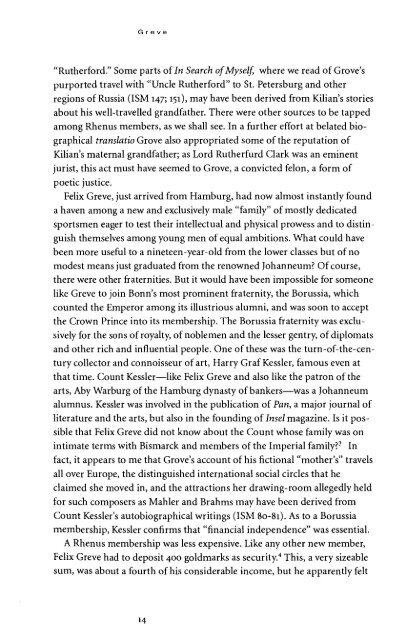Jean Rivard - University of British Columbia
Jean Rivard - University of British Columbia
Jean Rivard - University of British Columbia
You also want an ePaper? Increase the reach of your titles
YUMPU automatically turns print PDFs into web optimized ePapers that Google loves.
Grève<br />
"Rutherford." Some parts <strong>of</strong> In Search <strong>of</strong> Myself, where we read <strong>of</strong> Grove's<br />
purported travel with "Uncle Rutherford" to St. Petersburg and other<br />
regions <strong>of</strong> Russia (ISM 147; 151), may have been derived from Kilian's stories<br />
about his well-travelled grandfather. There were other sources to be tapped<br />
among Rhenus members, as we shall see. In a further effort at belated biographical<br />
translatio Grove also appropriated some <strong>of</strong> the reputation <strong>of</strong><br />
Kilian's maternal grandfather; as Lord Rutherfurd Clark was an eminent<br />
jurist, this act must have seemed to Grove, a convicted felon, a form <strong>of</strong><br />
poetic justice.<br />
Felix Grève, just arrived from Hamburg, had now almost instantly found<br />
a haven among a new and exclusively male "family" <strong>of</strong> mostly dedicated<br />
sportsmen eager to test their intellectual and physical prowess and to distinguish<br />
themselves among young men <strong>of</strong> equal ambitions. What could have<br />
been more useful to a nineteen-year-old from the lower classes but <strong>of</strong> no<br />
modest means just graduated from the renowned Johanneum? Of course,<br />
there were other fraternities. But it would have been impossible for someone<br />
like Grève to join Bonn's most prominent fraternity, the Borussia, which<br />
counted the Emperor among its illustrious alumni, and was soon to accept<br />
the Crown Prince into its membership. The Borussia fraternity was exclusively<br />
for the sons <strong>of</strong> royalty, <strong>of</strong> noblemen and the lesser gentry, <strong>of</strong> diplomats<br />
and other rich and influential people. One <strong>of</strong> these was the turn-<strong>of</strong>-the-century<br />
collector and connoisseur <strong>of</strong> art, Harry Graf Kessler, famous even at<br />
that time. Count Kessler—like Felix Grève and also like the patron <strong>of</strong> the<br />
arts, Aby Warburg <strong>of</strong> the Hamburg dynasty <strong>of</strong> bankers—was a Johanneum<br />
alumnus. Kessler was involved in the publication <strong>of</strong> Pan, a major journal <strong>of</strong><br />
literature and the arts, but also in the founding <strong>of</strong> Insel magazine. Is it possible<br />
that Felix Grève did not know about the Count whose family was on<br />
intimate terms with Bismarck and members <strong>of</strong> the Imperial family? 3 In<br />
fact, it appears to me that Grove's account <strong>of</strong> his fictional "mother's" travels<br />
all over Europe, the distinguished international social circles that he<br />
claimed she moved in, and the attractions her drawing-room allegedly held<br />
for such composers as Mahler and Brahms may have been derived from<br />
Count Kessler's autobiographical writings (ISM 80-81). As to a Borussia<br />
membership, Kessler confirms that "financial independence" was essential.<br />
A Rhenus membership was less expensive. Like any other new member,<br />
Felix Grève had to deposit 400 goldmarks as security. 4 This, a very sizeable<br />
sum, was about a fourth <strong>of</strong> his considerable income, but he apparently felt

















